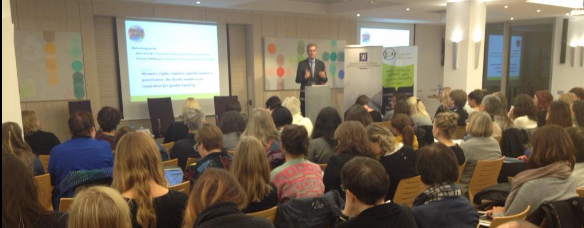[Brussels, 14 June 2012] Members of the European Parliament heard last week how the portrayal of young girls in the media is feeding a dangerous trend which contributes to gender inequalities and violence against women. The Parliament is to due to adopt a Report on the issue in October.
The EWL is deeply concerned with the increasing sexualisation of young girls in media today. The problem of sexualisation refers to the imposing of adult sexuality on children, especially girls, at an age when they are mentally, physically and emotionally not ready. Further, it gives young girls the belief that they are valued on their physical attractiveness leading to an objectification of women. The issue of sexualisation can be seen everywhere today, in advertisement, computer games, movies, magazines, music, fashion, cell phones…
The problem has been acknowledged by the European Parliament. For this reason, a meeting was held regarding the sexualisation of young girls on 06 June 2012 in the Parliament aiming to raise awareness of the issue among public authorities and develop concrete strategies to combat it. This meeting was organised by MEP Joanna Skrzydlewska, author of the upcoming report, as well as the the EPP Group of which she is a member. Experts from all over Europe were invited to share their observations and experiences regarding the sexualisation of girls.
Sexualisation has become like a wall paper, all the time constantly in the background, to the extent that we do not even see it anymore as Dr. Linda Papadopoulos described it. Dr. Papadopoulos is a psychologist and an expert on the subject of the effects of sexualisation on young people. She presents statistics concerning the issue as well as concrete examples:
- When asked about future profession, 62 % of young girls wanted to be a glamour models and 25 % want to be a lap dancers.
- The playboy bunny is a logo on writing pads for young girls today.
- There is a computer game where you score points for beating up a prostitute. This game was given 10 out of 10 in several reviews and the NY-times said it gave “a new level of depth for an interactive entertainment experience.”
- Violence has been made into something sexy in media.
- 1 out of 3 teenagers have experienced sexual violence from their boyfriends.
- 11 years old is the average age of being exposed to porn.
- 10 year olds are being sexually harassed in school.
According to Dr. Papadopoulos, children growing up today are arguably the first generation ever to be exposed to rape and sexual violence before having their own first sexual experience. This normalises and legitimises sexually abusive behavior which can be seen in statistics. Violence against women has increased in the US by 400% since 2004. Over the same time period it rose in advertisements by 120%.
Dr. Papadopoulos also discusses other problems related to the sexualisation of girls in media. It results in an objectification of women which has had serious consequences. For example, there has been a drastic increase in plastic surgery; between 2002 and 2003 the number of breast implants for girls under 19 trippled. In addition, 75% of 7-11 year olds want to change parts of their physical appearance and four out of five children are afraid of becoming fat. This has resulted in a dramatic increase in eating disorders. Further, young girls are shown wearing make-up, sexy underwear and posing provocatively. The French Vogue portrayed six-year-olds in heavy make-up and high heels, sexualising them by placing them in these settings (see picture above). What are we doing to young girls?
Joanna Skrzydlewska: “We should ask ourselves if the direct results of sexualisation, such as the increase of child sexual abuse, the intensification of the phenomenon of child pornography or the increase of sexual violence against women and girls, are the price we want to pay in relation to the commercialisation of life and human relations.”
Please find more information on this subject here below:
- Press Release 06 June 2012 – Sexualisation of girls: let children be children. Joanna Skrzydlewska MEP
- Press Briefing 04 June 2012 – Sexualisation of girls: let’s not deprive children of their childhood. Towards a strategy for reducing impossible-to-meet standards
- EP Procedure file for Report on Sexualisation of Girls
- Linda Papadopoulos, UK Government Report 2010 – Sexualisation of Young People


